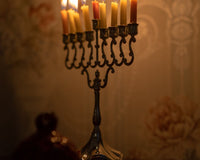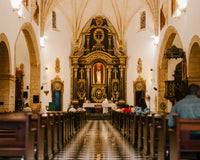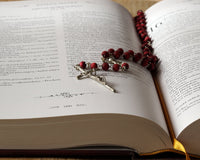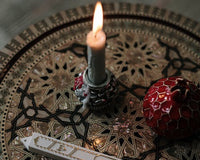You’ve probably seen mezuzahs hanging on doors, but do you know what they really are and represent? Some think it’s a good luck charm or decoration-- but it’s far more than that. What is the history of the mezuzah, what are the requirements of one that is kosher, and how are they used in our modern lives?
What is a Mezuzah?
A mezuzah (also spelled Mezuza) is a special parchment that has the scriptures of Deuteronomy 6:4-9 and 11:13-21 inscribed upon them. These scriptures are known as the Hebrew words of the Shema and Vayaha. These scrolls hold great weight-- they are a handwritten reminder of the obligations that the Jews have to God.
If you’re wondering why you’ve never seen a scroll hanging on a door, it’s because the scroll is housed in a protective case. This is done in a way that allows a specific portion of the parchment to show (this portion contains the word Shaddai, which means “Almighty”).
The word mezuza literally translates into the word “doorpost” from Hebrew, and after a specific blessing is recited, it is attached to the main doorpost of a home.
The History of the Mezuzah
The beginnings of the mezuzah are most commonly traced to the Jewish year 2448 (1312 b.c.e.) when it was given as a commandment at Sinai. The commandments within the verse instructed the Jews to “inscribe them upon the doorposts of your home and upon your gates.”
Historians aren’t certain that mezuzot (a common plural spelling of mezuzah) was actually used during the Jew’s forty-year sojourn through the Sinai desert. Some say the Jews of that time were exempt from the use of the mezuzah because their living spaces weren’t permanent. However, many believe that the scrolls were used more prevalently and permanently when the Jews settled within the land of Canaan beginning in the Jewish year 2488 (1272 b.c.e).
How Mezuzot are Used Today
A mezuzah is a public declaration of the Jewish faith of those that dwell within a home. They are visual reminders and physical representations of God's commandments and presence to those within the house. To the homes that hang a real mezuzah properly, they also believe that it offers protection to their home and those within it. The power of the mezuzah is so great that even those who are not Jewish use them, claiming that the scrolls bring them good fortune.
Things to Remember
You should be selective when deciding where to get your mezuzah. There is a detailed, complicated process that goes into creating a kosher one. Be sure your mezuzah scroll parchment is genuine (created using the skin of a kosher animal), and that the Hebrew verse from the Torah is scribed by a sofer (a trained calligrapher) using their special pen and ink. Remember that a single mistake or crack makes the parchment invalid.
If you want to be certain you have a genuine, kosher mezuzah, you can learn more here.






